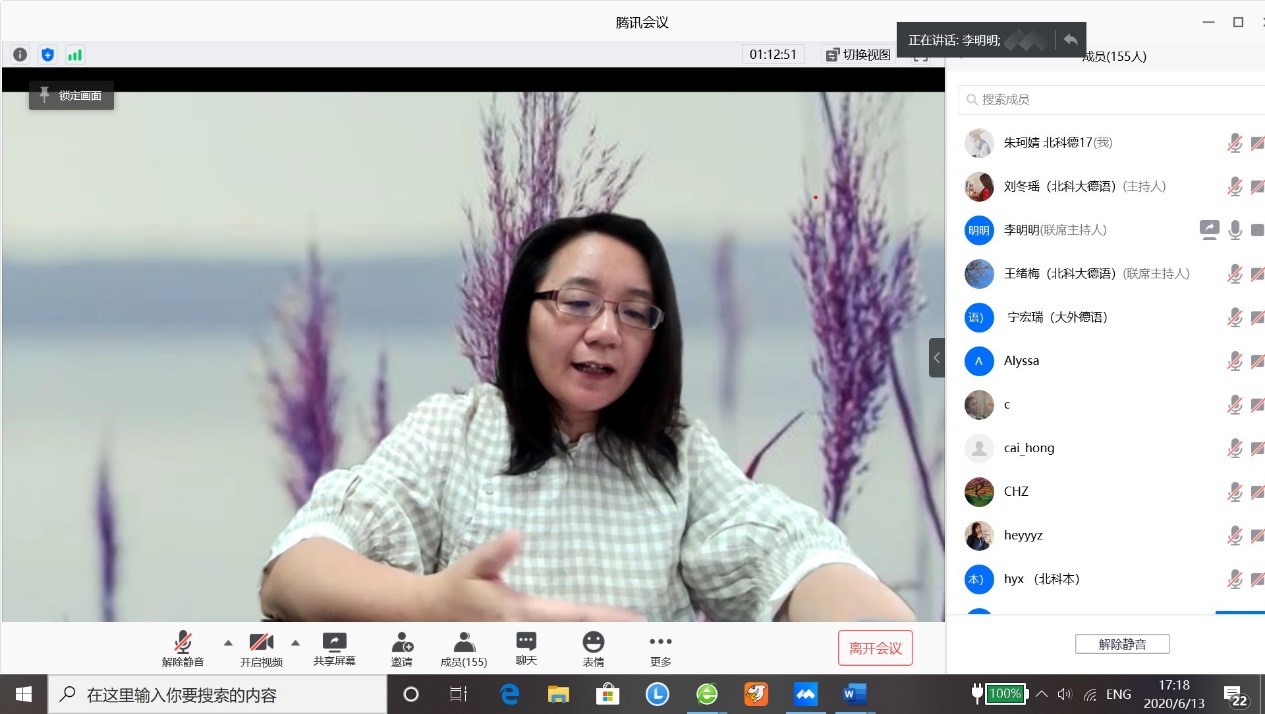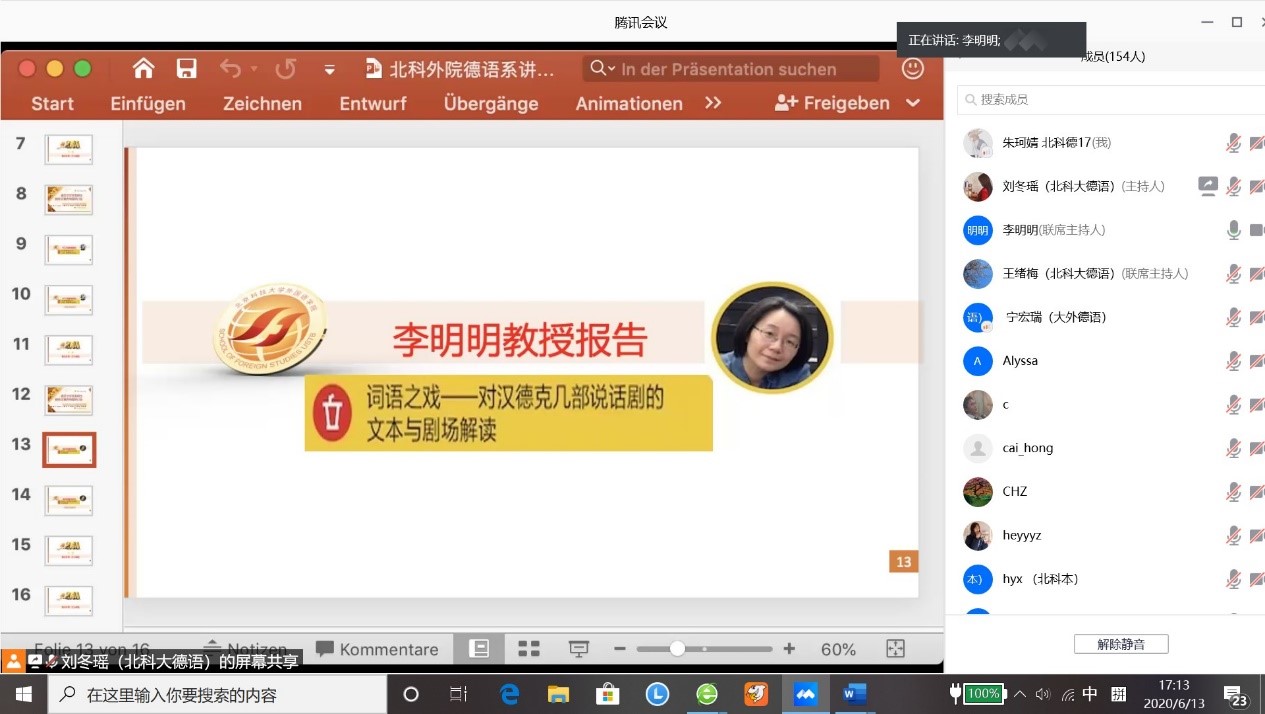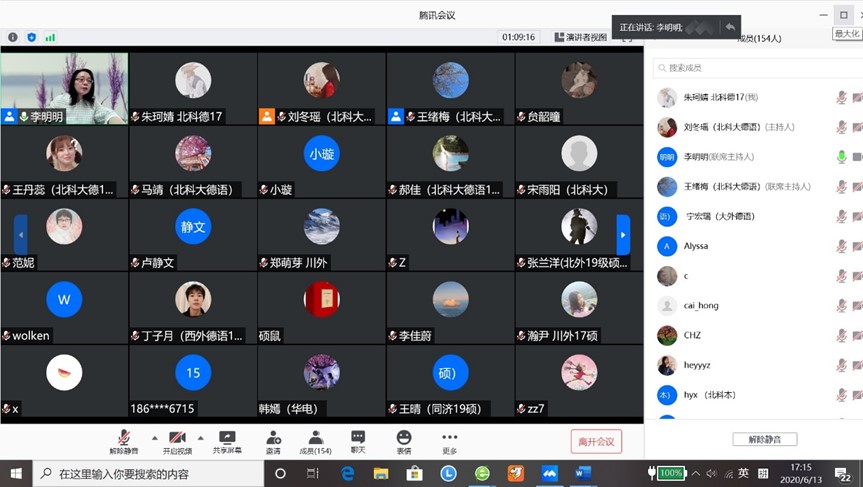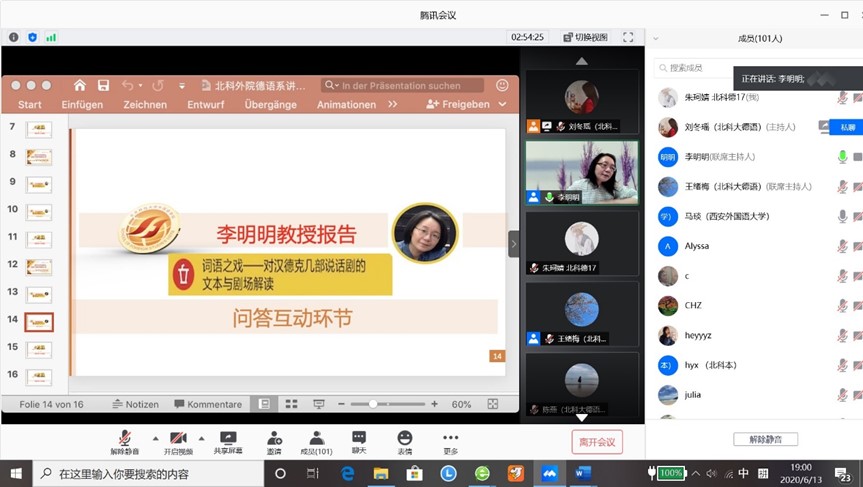The 4th Session of the Seminar on Peter Handke

On June 13, 2020, 5:00 p.m., we were honored to have Associate Professor Li Mingming from the Department of Foreign Studies at Tsinghua University to deliver the 28th lecture for the activity of “The Road to Worldwide Humanities” and “the Collaboration and Exchanges of Experts Invited by the Department of German”.
Mrs. Li gave us a lecture entitled “The Play of Words: Textual and Theatrical Interpretations of Peter Handke’s Several Sprechstuecke”. In the two-hour lecture, Prof. Li Mingming took Handke as a representative writer of the post-theatre, and took four works as examples, including Publikumsbeschimpfung and Selbstbesichtigung , Weissagung and Hilferufe, and by quoting the theories of Benjamin and Agamben to give a systematic and detailed explanation of the text and theatre of Handke’s plays. In the exchange session following the report, she had a heated discussion with nearly 200 teachers and students from nearly 20 universities across China, including Peking University, Tsinghua University, Beijing Foreign Studies University, Beijing Language and Culture University, Xi’an International Studies University and Sichuan International Studies University.

The lecture was hosted by Liu Dongyao, lecturer of the SFS’s Department of German Language and Literature. She first gave a brief introduction of the speaker. As an associate professor in the Department of Foreign Languages at Tsinghua University ,Prof. Li Mingming has participated in several key projects of the National Social Fund. Her research mainly concentrates on contemporary German literature, literary theory, and cultural studies. In the past three years, She had published three research papers on Handke in top-tier journals such as Foreign Literature, and one of them was reprinted in Information Center for Social Sciences of Renmin University of China.

Prof. Li Mingming began with a quote from Sun Bo, pointing out the positioning of Handke’s sprechstueckein the Western theatrical genealogy - between modernism and postmodernism, between dramatic and theatrical types, at the break between the exhaustion of language and the new epoch in which the body was rediscovered. She illustrated the changes in the content and form of modern theatre as compared with traditional theatre, and discussed the dual medium of theatre, the relationship between text and theatre, the aesthetic turn within theatre, and the issues of body, perception, discourse, space, atmosphere, presence, and event in the context of the development of theatre. According to Prof. Li Mingming, The Prophecy began with a vain prophetic in a flat statement, which presented a mechanistic and stereotypical appearance, and the lack of a clear referent under the huge sound stimulus constantly led to a polyphonic theatre with openmeaning. Self-Accusation appeared to be a report on growth, but it was a substantial complaint accomplished through the order of sound, where the voice was amplified, language gradually revealed, and human growth was merely incorporated into the rules and order of language. The topic of Accusing the Audience was “accusing”. The act of accusing broke taboos and the performance of the play broke stage restrictions. After a brief period of explanation and praise, one by one the curse words were gradually piled up, generating energy and eventually creating a picture of the sound image that rose and fell. As for Cry for Help, Prof. Li Mingming considered it to be Handke’s most experimental and inspirational play for the development of post-theater. Hilfe was the target of the game and the motive of the play, and the audience, as witnesses, finally cried out for “help” under the constant impact. Ethical propositions were instantly diluted by the situational framework of the language game, the actual scene occurred naturally, and the reality gained power over the fiction. After a detailed analysis of the texts of the four plays and the connotations of the theater, Prof. Li Mingmingreturned to Handke in her conclusion, pointing out that Handke was at a turning point for two reasons: first, the theater was transformed from letters to words, with words being exhausted and expressionsreconstructed; second, the audience were involved in, and the boundary between stage and audience was broken, with the audience no longer being spectators but witnesses.

After Prof. Li Mingming’s informative lecture, students and teachers actively raised their questions. Liu Yi, a graduate student of the German Department of Sichuan Foreign Studies University, Chen Danyang, an undergraduate student of Beijing Language and Culture University, Yue Zihan and Zhang Shu, doctoral students of the Institute of Foreign Literature of Beijing Foreign Studies University, Ma Yan, a teacher of the German Language Institute of Xi’an International Studies University, and Professor Nie Jun, the former head of the Department of the German Language, the Secretary-General of the Foreign Literature Association of Shaanxi Province, the translator of Handke’s works and the leading expert on Handke’s studies all raised their questions. They had a heated discussion on the inevitable connection between pop music and the rhythm of Handke’s sprechstuecke, the understanding of word poses, the border between truth and fiction, the aesthetics of the present, docking theater, and the future direction of Handke’s studies. Mrs. Li answered each question with patience.

At the end of the discussion, the host, Liu Dongyao, expressed her gratitude on behalf of the organizers to all the audience for their participation in the two consecutive days of the event, which lasted for more than ten hours. She also thanked the speakers for their valuable insights, the audience for their questions, and especially everyone’s support for this event. The audience also expressed their gratitude to the organizers and the faculty and students of the Department of German. The three lectures on Saturday afternoon lasted for seven and a half hours and ended successfully. The lecturers’ persistence in their research, rigorous attitude, and passion for literature are all worth learning from. We would like to thank Shan Menghui and Zhu Kejing from the Department of German for their help in managing the online participants.
So far, the Peter Handke session of “the Collaboration and Exchanges of Experts Invited by the Department of German” came to a successful conclusion. More than 1,500 students and teachers from more than 50 universities and colleges logged onto the online meeting room for the four lectures, and the number of online visitors peaked at nearly 200. The lectures were participated by many students and teachers from the Department of German as well as the English and Japanese Departments. The conference was attended by a large number of teachers and students from other universities, including Chinese translators of the Handke’s works (e.g. Prof. Nie Jun and Prof. Zhang Shisheng from Xi’an International Studies University, Associate Prof. Ding Junjun and Associate Prof. Zhang Yanjun from the Department of German of the Beijing Foreign Studies University, Associate Prof. Wang Yanhui from Beijing Institute of Technology, etc.). The lectures were also attended by teachers and students of the German departments from universities across China, as well as employees of various publishing houses, including Peking University, Tsinghua University, Beijing Foreign Studies University, Shanghai International Studies University, Xi’an International Studies University, Sichuan International Studies University, Tianjin Foreign Studies University, Guangdong University of Foreign Studies, Suzhou Foreign Language School, Zhejiang International Studies University, Jilin International Studies University, Nanjing Foreign Language School, Zhejiang University, Fudan University, Tongji University, Beijing Language and Culture University, Beijing Institute of Technology, Beihang University, Renmin University of China, University of Chinese Academy of Social Sciences, Shandong University, Xiamen University, Soochow University, Huazhong University of Science and Technology, Liaoning University, China University of Political Science and Law, China Foreign Economic and Trade University, North China Electric Power University, Qingdao University, Anhui University, Nanjing University, Tianjin Normal University, Shandong Normal University, Northeast Normal University, Jilin Normal University, Shanxi Normal University, Shandong Jianzhu University, Jinan University, Ocean University of China, Shanghai DianJi University, Xi'an University of Technology, Jiangsu University of Technology, University of Shanghai for Science and Technology, Chongqing University of Posts and Telecommunications, Zhengzhou University, Xiangtan University, Munich University, Tübingen University and Free University of Berlin, Higher Education Press, Foreign Language Teaching and Research Press, Tongji University Press, and HorizonBooks. Thanks to the SFS for providing such an excellent platform and a unique opportunity for the Chinese researchers of Germanic languages and literature!
Contributors: Shan Yinmeng, Liu Dongyao
